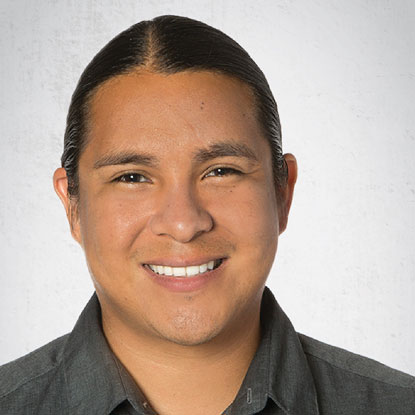Tillman Scholar Voices: Amplifying Indigenous Voices through Data With Jameson Lopez
“It’s about protecting the things that our tribal communities have had to endure throughout the last couple of centuries. You think about the fight for water, the fight for land, the fight for culture. We are looking at these outcomes that are important to our tribal community values while also keeping hold of what’s going on in the world. You’re trying to figure out ways to infiltrate […] and also where we’re able to sustain what we have left of our culture.”
Our Tillman Scholar Voices blog and video series amplifies the work of Tillman Scholars who actively work toward equity and justice and showing us every day the importance of leading through action. This week we highlight Jameson Lopez and how he uses his experiences as a Quechan citizen and Indigenous quantitative researcher to create more awareness and visibility around Native communities.
Jameson Lopez is a 2015 Tillman Scholar, Army veteran, Arizona State University graduate with a Ph.D. in educational policy and evaluation and an Indigenous quantitative researcher.
Throughout college, Jameson was heavily involved with student life and worked in admissions and recruitment. He discovered the limited number of other Indigenous students pursuing their education as well as the lack of data reflecting their history and experiences. Having grown up in an Indigenous community himself, and with a strong passion for protecting his heritage, Jameson took it upon himself to start collecting data that would accurately represent Indigenous people and bring their stories—both past and present—to light.
Connection Through Service
Coming from a family of grandfathers, uncles and cousins who served in the military before him, enlisting in the Army and carrying on the “warrior tradition” felt natural to Jameson. One of his most memorable interactions was meeting and befriending a Kurdish officer in the Iraq army who would often show him around his community. Through these exchanges, Jameson realized how much would have gone unnoticed without that guidance, leading him to connect this to his own community and the power of creating visibility. Jameson ended his service being thankful for the relationships he built and the awareness he gained of different cultures.
“For me, going to Iraq and then coming back to my own community—even what I was doing before working with Native communities—you see some parallels in that there’s some misunderstanding society may have about us,” he said. “I focused on how to develop a message or a voice so that people can be able to see what this life is about and the challenges and the successes that we do have within our own community.”
Fighting Invisibility with Data
“I want to be able to collect my own data so that it’s relevant to the tribes. Many of the federal data that’s out there right now, it’s irrelevant, it’s inconsistent,” Jameson notes. “It may have been collected in an environment of mistrust. There are all kinds of issues with the data itself.”
Using the academic setting as an example, Jameson points out that collecting this data is vital to share experiences unique to Native communities and people. He looks at this in terms of going to college and wanting to give back to one’s community, which looks different for an Indigenous student.
“The need to go to college, to want to protect their community, to give back to the community, it’s about protecting the things that our tribal communities have had to endure throughout the last couple of centuries,” he said. “When it comes to just our culture itself, Native students also consider how it’s been removed a lot from the schools through assimilation, and how we get that back into the curriculum.”
Promoting Self-Education
Today, many stereotypes around Indigenous communities still exist. In addition to invisibility within data, this is also largely due to false interpretations in pop culture and mainstream media. Jameson offers that to combat these negative stereotypes, it is up to non-Native individuals to take responsibility and educate themselves, especially in connection to this current moment.
“This is an opportunity [to] educate yourself…It is an opportunity to be able to teach your kids that something that has been missed within the educational setting,” he said “That’s where I find a little bit of light through all of this. There are parts of the curriculum that you wish your students would know, you wish your kids would know. Now this is your opportunity to re-educate them…If I could speak to everyone, it’s this: go out and find something about Indigenous people that’s relevant to today.”
Jameson’s Recommended Resources
- American Indians in Children’s Literature, established by Debbie Reese
- “Custer Died for Your Sins: An Indian Manifesto” by Vine Deloria
- Heather Shotton, associate professor in Educational Leadership and Policy Studies at the University of Oklahoma, Indigenous higher education scholar and Indigenous education advocate
- Amanda Tachine, assistant professor in the Mary Lou Fulton Teachers College Teachers College and postdoctoral scholar at the Center for Indian Education at the University of Arizona, Indigenous higher education scholar and Indigenous education advocate




